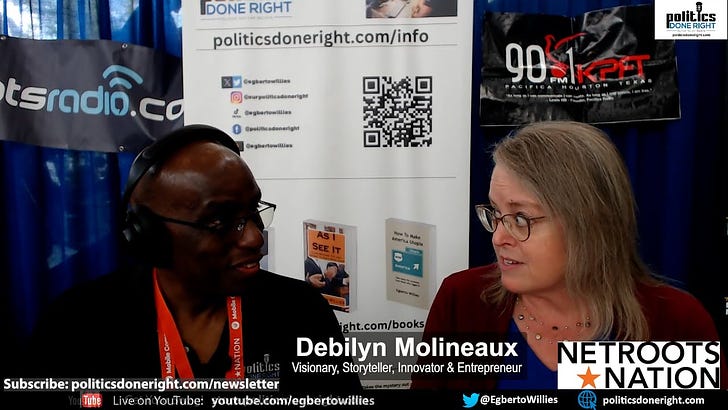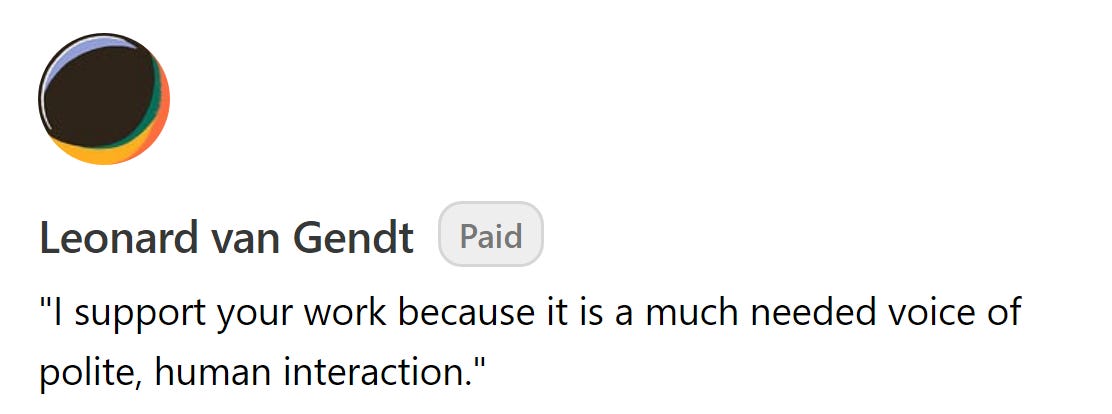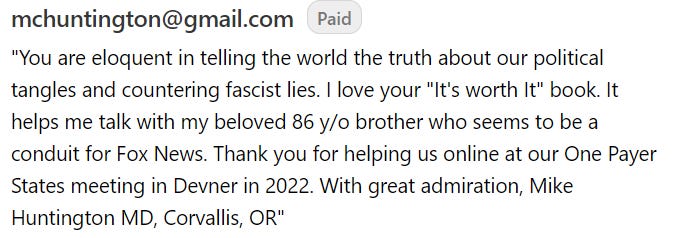Debilyn Molineaux, American Project founder, discusses the ills permeating America and solutions.
Visionary, Storyteller, Innovator, Entrepreneur, and American Project founder Debilyn Molineaux visited Politics Done Right at Netroots Nation 2024 to discuss America's ills and how to solve them.
THANK YOU IN ADVANCE FOR YOUR SUPPORT! We are feverishly working triple time to ensure we win this existential election.
We are grateful for our Paid Subscribers and Free Subscribers. In this political climate, we need several hundred more Paid Subscribers. Misinformation funded by the deep pockets of our Oligarchy floods the internet. We are using all our platforms on-air, online, and in publications to counter that. We ask that you invest the equivalent of less than a coffee to ensure we can keep doing this effectively. Please invest in a Democracy that serves all of us by becoming a paid subscriber. It comes with many benefits.
Debilyn Molineaux on America’s ills.
Debilyn Molineaux, former president of the Coffee Party USA and former president and CEO of the Bridge Alliance, discussed the current challenges plaguing America and shared her vision for a more hopeful and collaborative future. Molineaux has long advocated for political bridge-building, emphasizing the importance of dialogue and deliberation across partisan lines. However, she expressed frustration with the superficial nature of many current attempts at dialogue, explaining that too often, people are focused on persuading others rather than genuinely connecting and working together to create better solutions.
One of the key themes of Molineaux’s conversation was the confusion and disillusionment many Americans feel about the state of democracy. As she succinctly put it, “Politics doesn’t work; democracy has not delivered on its promise.” This sentiment is not unique to Molineaux but is echoed across the political spectrum. Many Americans feel that the political system has become dysfunctional, failing to address the needs of the people and leaving them with little hope for the future. Molineaux points to a lack of imagination and future-oriented thinking as one of the root causes of this disillusionment. Instead of envisioning a future full of possibilities, Americans are consumed by narratives of decline and collapse.
Molineaux highlighted the various “end-time” stories that dominate American discourse in the interview. On one end, MAGA supporters fear the rise of socialism and are determined to prevent it. On the other end, progressive activists fear the emergence of authoritarianism and are working tirelessly to combat it. Climate change activists are driven by the fear that humanity may not survive if urgent action is not taken to address the crisis. Meanwhile, religious groups believe that the end times are upon us and are preparing for Armageddon. Each of these groups is focused on preventing the future they fear rather than building the future they desire.
This focus on fear and avoidance, Molineaux argues, is counterproductive. Neuroscience, she explains, shows that people tend to manifest what they focus on most. If we constantly think about what we don’t want, we are more likely to create situations reflecting those fears. In contrast, if we focus on what we want to achieve, we can create positive outcomes. This is why Molineaux is passionate about her new project, “American Future.” Through this initiative, she hopes to inspire Americans to shift their focus from what they fear to what they want to create. She encourages people to ask themselves, “What kind of future do I want?” and then take steps to make that vision a reality.
Molineaux likened this mindset shift to the natural behaviors of five-year-olds. “We need to do the things we used to do naturally when we were five years old,” she said, such as sharing, comforting others, and playing well together. In many ways, these simple values hold the key to building a better future. If we can learn to reconnect with one another on a human level, we can begin to build the collaborative and compassionate society that many Americans desire.
Another important aspect of Molineaux’s message is the need for self-reflection and personal responsibility. She emphasized that many people don’t know what they want for their own lives. They spend so much time reacting to the things they don’t want that they fail to clarify their vision for the future. Through her project, Molineaux hopes to guide people in identifying what they truly want and then training their minds to focus on those positive outcomes. As Molineaux pointed out, this is not just “new agey” thinking but is rooted in actual neuroscience. By changing how we think, we can change how we act and, ultimately, the world around us.
One key tool Molineaux offers through American Future is a self-interview, which consists of eight questions designed to help people clarify their goals and desires. She encourages people to download the self-interview and trade answers with someone else, fostering deeper connections and conversations. Molineaux also hosts a podcast, Terrified Nation, where she shares American future stories and offers her reflections to help guide people toward the future they want to create.
Molineaux’s message is one of hope, but it also requires action. If Americans want to change the country’s direction, they must first change their thinking. They must stop focusing on their fears and start imagining a better future. This will not be easy, especially in a society that is so deeply divided and entrenched in fear-based narratives. But as Molineaux pointed out if five-year-olds can share, comfort, and play well with others, so can adults.
Debilyn Molineaux’s insights offer a refreshing perspective in times of great uncertainty and division. Her emphasis on shifting focus from fear to hope, on connecting with others rather than persuading, and on building a future rather than avoiding disaster presents a path forward that is both practical and inspiring. As Americans search for answers to the many ills permeating the nation, Molineaux’s message deserves to be heard and heeded.
Viewers are encouraged to subscribe and join the conversation for more insightful commentary and to support progressive messages. Together, we can populate the internet with progressive messages that represent the true aspirations of most Americans.
Can we count on your help to reach our goal of 300 needed new paid subscriptions by the end of the month?
The other side has big donors and everyday citizens who invest heavily in platforms that lie and misinform. All we have is you. So, please invest in our media outlet by clicking the subscribe button below to become a paid subscriber. You won’t miss that coffee, but it will make a difference in our politics as we spread the truth about our policies and progressive politics. All paid subscribers get to read my five books on this platform and all subsequent books I write. They will also be privy to subsequent incentives.








